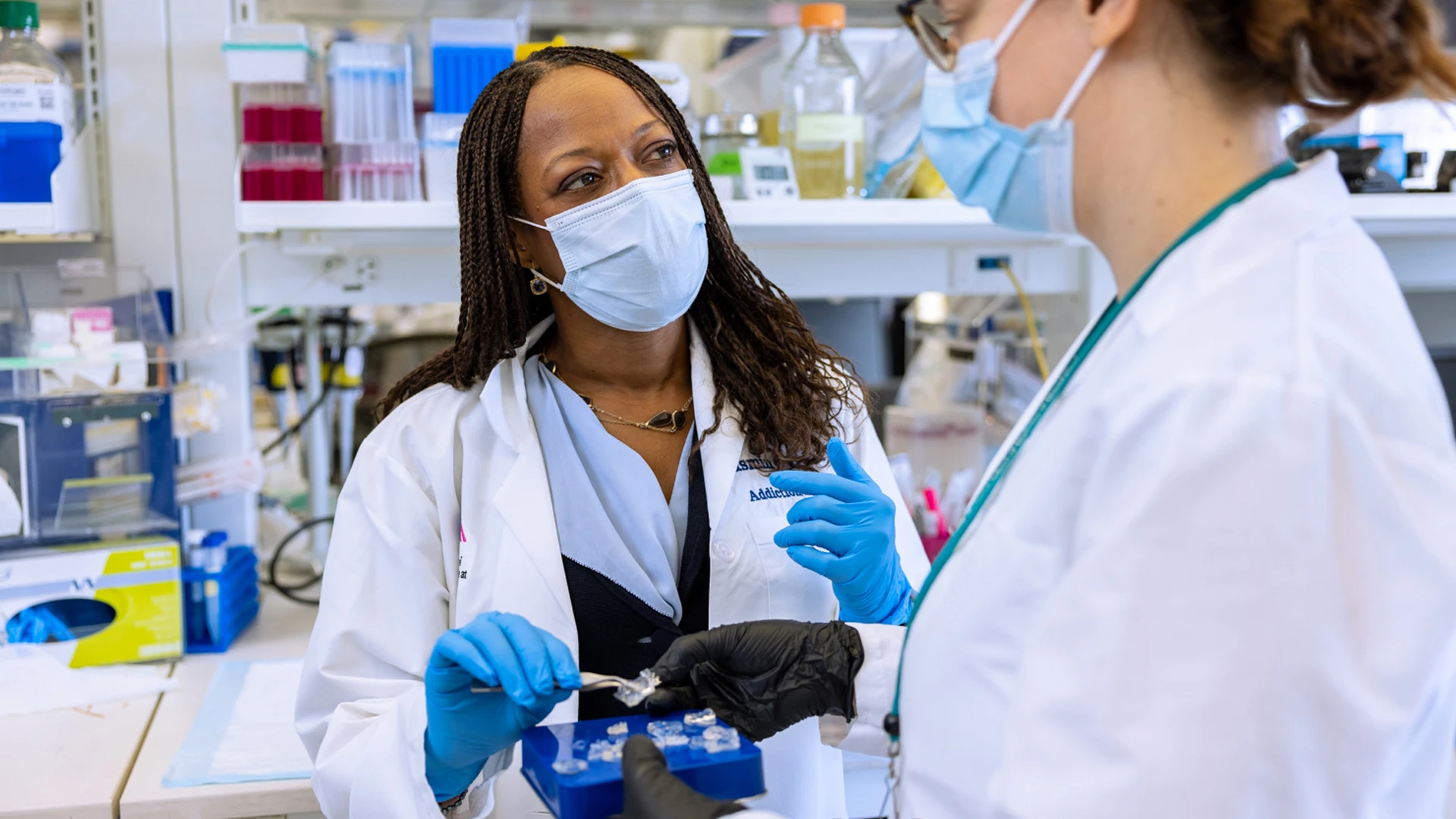When Yasmin Hurd, PhD, Director of the Addiction Institute at Mount Sinai, began her research years ago into the neurobiology of substance abuse disorders, few in the field were focused on the topic.
Today, her work is not only globally recognized, but is considered one of the many key drivers in a recent report from the National Academy of Science, Engineering, and Medicine (NASEM) on sounding the public alarm on the impact of increasingly high-potency cannabis on the human brain, particularly in adolescents and young adults. This is true especially for those whom the risk of cannabis use disorder (CUD) with potential lifelong mental health implications is rising sharply. Dr. Hurd served as co-chair of the high-level committee that issued the report.

Yasmin Hurd, PhD, has spent many years examining the impact of cannabis use on neurodevelopment. In a recent study, she and her team found evidence that adolescent cannabis use presents risk for developing a use disorder, with potential lifelong mental health implications.
“In the past, I felt I was screaming into the abyss and no one was paying attention, much less wanting to publish our papers,” recalls Dr. Hurd, who serves as vice chair of the committee that issued the report, and is the Ward-Coleman Chair of Translational Neuroscience and Professor of Pharmacological Sciences, Neuroscience, and Psychiatry at the Icahn School of Medicine at Mount Sinai. “Now people are replicating our data and reinforcing the understanding that high-dose cannabis and CUD have become a growing health care concern. They’re also acknowledging that the knowledge of the scientists, policymakers, and the public has failed to keep pace with the rapid expansion of the cannabis market in the United States.”
The Dangerous Road to Cannabis Use Disorder
Dr. Hurd’s latest study, published in May 2024 in American Journal of Psychiatry, emphasizes the rapidly changing cannabis use landscape. The study outlined strategies for addressing the “unfortunate disparity” between the prevalence of CUD and the number of youths who receive evidence-based treatment.
“The literature shows that youth who initiate use before the age of 18 are significantly more likely to develop CUD, with substance-related problems continuing into adulthood, and to experience adverse psychiatric and personal outcomes,” says Dr. Hurd, senior author of the study. “The risk of developing CUD also increases significantly among youth who use cannabis at least weekly, with the highest prevalence among those who use cannabis daily.”
Dr. Hurd and her team built a strong scientific case linking early usage to the impact of delta-9 tetrahydrocannabinol (delta-9 THC)—the most intoxicating component of the more than 500 chemicals found in the cannabis plant—on neurodevelopment. That interaction is thought to be mediated through the direct effects of THC on the endocannabinoid system. This modulatory system plays a vital role in regulating neural differentiation and migration, axon guidance, synaptogenesis, and myelination, as well as neurotransmitter system development.

Previously known risk factors for developing cannabis use disorder include social factors, environmental conditions, and personality traits. However, Dr. Hurd's study examines the role of yet unknown factors, such as early age of use and biological sex. She found that in the right combination of factors, earlier onset cannabis use increases that risk, and there is some evidence suggesting males could be at higher risk.
“Cannabis exposure during neurodevelopment has the potential to alter the endocannabinoid system,” explains Dr. Hurd. “This exposure can impact the development of neural pathways that mediate reward, emotional regulation, and multiple cognitive domains such as executive functioning and decision-making, all of which are central to substance-use disorder and psychiatric risk.”
With increasingly higher potency cannabis products entering the market, and the age of users lowering with greater acceptance of cannabis use, the Mount Sinai team has called for new, broad education efforts designed to counter thicket of misinformation regarding the safety of cannabis use readily accessible online and via social media. Such education efforts could be funded by tax dollars, especially in states that have legalized cannabis use, and combined with evidence-based behavioral interventions in primary care, social work, and school-based settings, any societal harm could still be reversed.
“The relationship among cannabis, high-potency products, and the risk of developing CUD and mental health problems clearly demands a new national approach to the addiction problem,” emphasizes Dr. Hurd. “Fortunately, the plasticity of the developing brain also offers us windows of opportunity for prevention and early intervention to change that trajectory.”
Pressing Need for Change Nationally
The ad hoc committee in which Dr. Hurd leads had been tasked by the federal government with investigating the impact of cannabis policies on public health, and there is growing evidence—including from Dr. Hurd’s body of work—for a need to address cannabis use nationally.
In the NASEM report, released in September 2024, newer cannabis products have been heavily engineered, cultivated, and manufactured to reach THC concentrations of up to 90 percent, while earlier products had only 2 percent to 4 percent. Another concern is the ubiquity of cannabis use today following its legalization in more than half of U.S. states, with cannabis use by people over 12 years of age now exceeding that of alcohol consumption in some places, as noted in the report.
18 million
Self-reported daily/near-daily marijuana users in 2022, up 20 times from 0.9 million in 1992
22%
U.S. population aged 12 and older reporting past-year cannabis use in 2022
14%
average THC levels of cannabis flower submitted to DEA for testing in 2019, up from >5% in 1995
The report also notes evidence for links between high-THC products and mental health effects
Furthermore, new cannabis products—often marketed as harmless treatments for sleep, anxiety, or pain—are able to enter the market with minimal regulatory oversight, and state laws vary greatly and are patchy at best. Consequently, consumers have no way to know if these products are safe or effective, or if “dosage” on the label is even correct, researchers found.
“We’re not saying that cannabis is a horrible thing, only that the industry has manipulated cannabis and cannabinoid products in a way where we do not understand their danger to public health,” warns Dr. Hurd. “To treat them simply as food, cosmetics, or over-the-counter medication, as they’re now sold, is misleading, if not dangerous.”
The committee, along with a panel of scientists, pharmacologists, legal scholars, sociologists, and public health experts, have called on the Centers for Disease Control and Prevention to work with federal, state, and territorial partners to create a public health surveillance system to monitor cannabis cultivation and product sales, use patterns, and health impacts. These experts also called a public education campaign aimed at parents and the most vulnerable populations to highlight the risks of cannabis use as well as strategies to discourage unhealthful use.
Dr. Hurd believes that as such efforts move along, psychiatrists have an important role to play. “They need to ask more questions of their patients about cannabis use and have a more open dialogue with them on its potential toxic outcomes,” she says. “As marijuana becomes legal in more states and its use less stigmatized, these discussions, more possible than ever before, and ever more important.”
Featured

Yasmin Hurd, PhD
Ward-Coleman Chair in Translational Neuroscience; Director of the Addiction Institute of Mount Sinai
